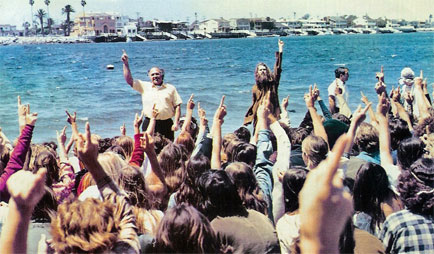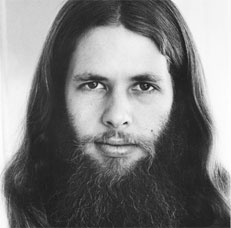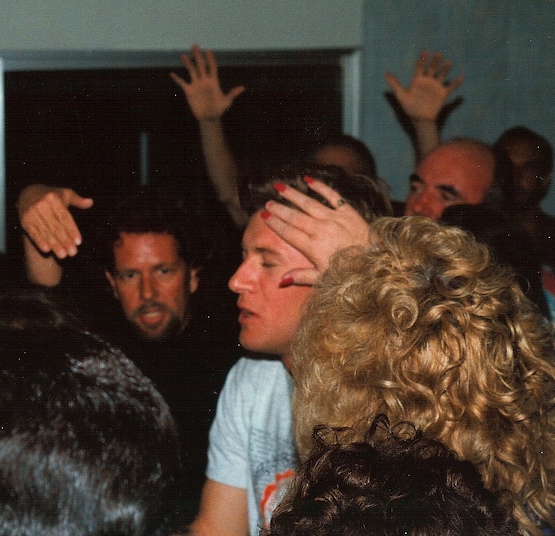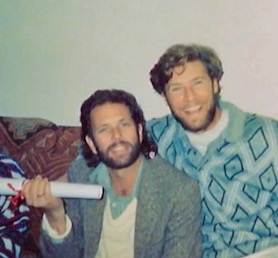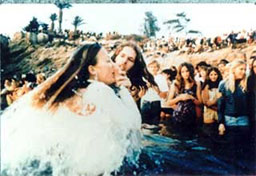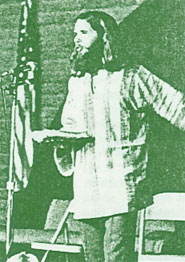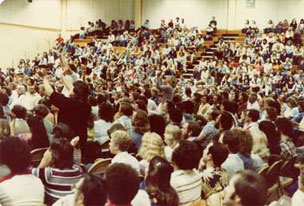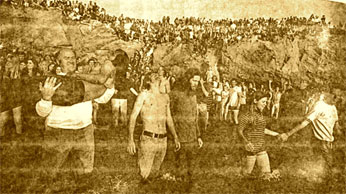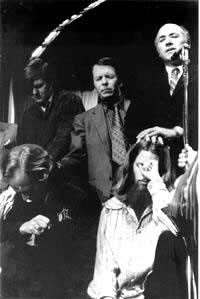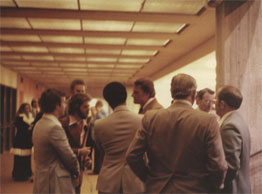These are some reflections on Lonnie and the Jesus Movement and Beyond
that I wrote out sometime after that season of hanging out with Lonnie:
There have been many publications looking back on “The Summer of Love” a couple of years ago, as it was its 50-year anniversary. The Summer of Love marked the Hippie Movement as something that had left the fringes and permeated and entered into mainstream society in American culture back then.
Though the American culture was experiencing disconcerting shifts back then, it is important as a Christian to reflect upon the revival that arose and broke out some fifty years ago in the middle of that cultural shift, a revival that came to be known as the Jesus People Revival.
Right in the middle of the cultural milieu that was the Hippie Movement, where young people were dropping out of mainstream society to seek something deeper but instead found dead ends in free love and drugs, God brought forth one of the biggest revivals in modern American history.
Most mainstream churches were just burying their heads in their hands and praying for the rapture to come soon, as they lamented the slide of modern culture into all-out degradation. However, God was, like so many times in history past, working behind the scenes to spring forth a powerful movement that would lead many to salvation and new life. He raised up actual missionaries right from within the Hippie Movement itself towards the wayward movement of hippies who were dropping out of society.
Enter Lonnie Frisbee, a man used by God in ways that boggle the mind. Testimony after testimony of those who knew, met, encountered or interacted with him, tell of lives changed dramatically towards knowing Christ and serving Him and being filled with God’s Spirit. The conversions of people that were connected with Lonnie often had people becoming committed to following Christ completely, and often entering ministry themselves. That type of repeated impact through a singular individual is just simply unusual and extraordinary.
In fact, so vibrant was his memory still, that more than a decade after his death, when a documentary of his life played at the Newport Film Festival it was the most popular film in the whole festival. It had sold out with a line around the block shortly upon its opening, and outsold a mainstream Hollywood movie which also debuted at that same festival.
Frisbee is also an important study within the discipline and thought of Missiology: The study of Christian mission work and practice throughout the centuries. When I did my Master’s Degree at Fuller Theological Seminary, I studied the famed missionary Hudson Taylor who ventured deep into inland China, learning from the Scriptures and the study of Paul the Apostle that he must adopt the language, style, thought and dress of the Chinese to effectively reach the Chinese. In the same way, Frisbee’s outreach to the hippies was made all the more effective because of his similar ability to identify with them by being a hippie himself and knowing the dress, language, and having intimate knowledge of the subculture.
And yet, just as Taylor was roundly criticized and slandered by the religious community of his day for doing this, but is now seen all these years later as one of the most insightful and biblically illuminated men of his day to understand this, likewise, Frisbee’s insistence on remaining a hippie to reach the hippies earned him nothing but the same kind of scorn and rejection as well from the larger religious community, never being perceived as actually a missionary to a subculture by tradition-bound holders of the status quo; this, along with his unbending stance on the need for Pentecostal power to be central in all he did, only added to the scorn heaped on him as well. (It should be remembered that the Pentecostal movement was reviled and excoriated by many mainstream Christian leaders in America for many decades, that negative attitude directed towards it was still prevalent in the era when all this was happening.)
At the same time, Lonnie was a man with obvious weaknesses, flaws, and shortcomings, things that he seemed to be constantly dealing and struggling with.
God indeed chooses the weak things of the world to shame the wise! This is what the Word of God tells us. It is truly perplexing that we should be so surprised when we actually see it happening in our own lifetime right before our very eyes.
Here then is a story not of human might or power, but of God’s Spirit moving upon and through a weak human vessel who simply said “Yes, Lord” to God's call, and consequently was used by God in ways that truly do boggle the mind. It is not at all unlike the stories that fill the pages of Scripture: one of blessing and grace, but also of failings and frailty.
Ultimately though, it is about Christ’s glorious redemptive power. It is the story of the Lord who never leaves nor forsakes His own, even in the face of bitter wrestling with their own human flaws. It is about that unconditional love of Jesus who will not abandon His own in spite of all their weakness and shortcomings.
The Scripture: “He chose the foolish things to confound the wise” truly comes to life here as Frisbee, though often overlooked, actually became one of the main players in that awakening that arose seemingly out of nowhere and which later became known as the Jesus People Revival, one of modern America’s biggest revivals.
In Retrospect: The end of Lonnie’s life
We were there for the end of Lonnie’s life and it was very redemptive. The mysterious ways of the Lord who somehow turns a cruel crucifixion into eternal salvation, for those who will simply believe, never ceases. Likewise, that mysterious grace never ceased working in Lonnie’s situation, not even in the lowest moments.
Elijah the Old Testament prophet is a good reference point in this. Elijah was used powerfully by God in many ways and experienced a great victory in defeating the false prophets of Baal. Yet, shortly after this victory, he falls into a complete spiritual and emotional tailspin when the demonic spiritual warfare from Jezebel’s threats against the Lord’s anointed overcome him.
While on his way from Beersheba to Horeb, Elijah spiritually and emotionally crashes and falls into fear and becomes self-destructive and suicidal and starts praying for the Lord to take his life (1Kings 19:1-5).
Elijah was restored, by the mercy of the Lord, but was given a new task now: The preparing and anointing of the next generation who will go on after him and minister. He still continued to minister but must also prepare others now.
Likewise, Lonnie came into an emotional and spiritual crisis and became self-destructive and was overcome by the darkness and the bitterness that began eating away at his soul, this after some great victories in the Body of Christ, having been the Lord’s catalytic minister for two great revivals that gave rise to both the Calvary Chapel and Vineyard movements, along with doing so much mission work overseas and other ministry over the years as well.
He stumbled but God restored him, and Lonnie refocused with the new task of preparing those who would minister after he was gone. Just because it wasn’t in the headlines doesn’t mean he didn’t continue on with the will of God after his stumbles, in fact Lonnie kept doing lots of ministry until the very end.
Like Elijah after some of his greatest victories, Lonnie also stumbled as the darkness snuck its way in. He started becoming bitter towards the people and movements who he had been used by the Lord to impact so vitally. Lonnie said he felt that they failed to acknowledge the impact his ministry had on them.
Whatever rationalizations one might use to eliminate someone from their history, we must remember that the Bible never removes a single character out of its pages because they had flaws, or weaknesses , or stumbled. Just think of Jonah, Elijah, or Sampson, just to name a few! You know it could be that we are all weak and fleshly sometimes, leaders and lay people alike, and all of us are saved only by grace, and all of us make mistakes. Billy Graham was the only minister to go and visit the infamously defrocked televangelist Jim Bakker in prison who fell due to a financial and moral scandal. When asked in an interview why he went, Graham said: “Because I understand the weakness of our still remaining sinful nature and the corruption of our broken fallen flesh even as born again believers. Except for the grace of God there go I.”
Unfortunately, Lonnie let bitterness get into his heart; he already had wounds of rejection and other issues he had never dealt with, like being beaten mercilessly by his father early on and being molested as a young boy by a male babysitter. But he had never dealt with these issues, until the last few years of his life that is, because he said that there was no way, nor safe place, for him to do so. Furthermore, he said that he realized later that he was around people from a generation whose way of dealing with this stuff was to bury it and sweep it under the rug.
Fuller Theological Seminary, where I graduated from, is also a leader in the field of Christian Psychology. The growing field of Christian Psychology now understands that if someone has this type of severe trauma and abuse in their background and doesn’t ever deal with it, it is likely to result in a crash and crisis at some point!
After some stumbles along the way, Lonnie came into a very healing and redemptive time in the last few years of his life and began experiencing inner healing and processing his issues, including asking forgiveness and extending forgiveness to those he felt had hurt him.
Lonnie had garnered important lessons out of his time of being used in revivals, as well as his struggles, and he was excited to share his insights with us. We learned lessons from both his blessings and victories as well as his struggles and stumbles. There is an old saying: “You often learn more from your failures than your victories.”
Lonnie regularly reminded us personally: “Do not let bitterness get a hold of your heart. If it does, bring it to the Lord and let him do a work of healing in your life. I did not, and I let the bitterness fester, then the weakness of the flesh—our broken sinful nature—rose up and caught me unaware, and the darkness suddenly swept in and pulled me down and I stumbled, it cost me dearly!”
However, after a short time licking his wounds while out in the wilderness, he returned to the Lord and repented. He re-embraced his calling with force and a new focus and honed in to his calling like a laser (more on that another time).
He became committed to just one thing: to spend the rest of his time here on earth doing God’s will, every day, for the rest of his life.
He had a paradigm shift due to the crisis he had experienced and did not care any longer about fame, money, the size of meetings, nor popularity. Lonnie said, “These things are so fleeting and so superficial and yet we in the Body of Christ get so easily caught up and enamored with this nonsense. These things are so worldly, yet we believers so foolishly hold them in such esteem, to the consternation of the Lord.”
In his renewed focus during his last years, he was now committed to doing God’s will, whether there was just one person in his meetings or one hundred.
He regularly said: “The size of meetings does not matter to me anymore. It’s all about doing God’s will.” Then, with a loud shout in his delivery to make the point as strong as possible, he’d declare: “Never drop the will of God! I did and it cost me. Never, ever, let go of God’s will for your life!”
Amongst a few other things, he felt he must now pour into those who God had gathered around him to prepare them, as those who would continue on after he passed, with their own ministries.
We were blessed through a series of divine appointments to connect with Lonnie during this time. For me, Bryan, it was actually a reconnection: I had first encountered him in my early days at Calvary Chapel Costa Mesa when he was on his second stint there after coming back from Florida, and then later at a Bible study in Orange where he first prayed for me. Soon after, I was radically baptized in the power of the Holy Spirit at Calvary Chapel Yorba Linda, when Lonnie prayed for me in the back room in their meeting place at the Canyon High School Gym.
God connected me and my wife Mercedes to Lonnie personally, through a series of divine appointments, into a time of blessed friendship in his last years. We were hanging out with Lonnie and attending his meetings and retreats and conferences and going on ministry trips, which turned into an organic time of discipleship and mentoring for us. As well as going to all the meetings Lonnie was doing, we only lived about 2 miles from him in Corona Del Mar and he lived right across from the ferry on Balboa Peninsula. So we could just jump on our bicycles and ride down Bayside to Balboa Island and then take the ferry across the channel and get to his place rather quickly. So we were hanging out with him all the time.
There were also a handful of others who had been drawn to him. We all became friends and hung out together, as well as becoming his ragtag assistance crew, helping him out with things during that time. Some of those I remember were: Eric Janssen, David Sloane, Dennis Evans, Steve Zarit, Stan Frisbee, Roger and Roxanne Sachs, James Keough-Gore and Maureen Gore, Darrell and Evie Ballman, Heidi Halsall, and Sid Smith, amongst others, whose names may have escaped me for the moment (sorry if I forgot to mention someone…)
In this unique time of organic discipling and mentoring that lasted roughly three and a half years, Lonnie shared wisdom and insight from his ministry years and experiences, and prayed, prophesied, and imparted many things to us that set the course for our own lives and ministry!
Lonnie kept doing regular ongoing meetings until the end, many in conjunction with Set Free and Freedom Crusade which were also called “Righteous Parties"by Set Free. At these meetings he preached, taught from the Bible, shared lessons from his years in ministry, as well as sharing lots of Holy Ghost stories. There was all kinds of other ministry that he did in those last three and a half years including some ministry trips we took with him.
Set Free was a place of healing for Lonnie. Pastor Phil Aguilar a Harley-Davidson, chopper-riding biker, a one per-center and fellow outcast to respectable middle-class society, identified with Lonnie the wild ole hippie very easily. He welcomed him, embraced him, and stuck with him until the end, as did we.
Lonnie also was doing regular retreats and conferences out in Palm Springs, including occasional hikes up Tahquitz Canyon, where he had his first radical supernatural encounter with Jesus and the revelation of his ministry to come back in his hippie days. In fact, Lonnie and I were hiking up the Canyon one day, at one of his retreats, and had a radical divine encounter as we both found two different pieces of the same Bible laying in the sand. I ended up getting a face full of sand when Lonnie started prophesying over me when I found the second part of the Bible shortly after he found the first half, and I fell under the power of the Holy Spirit.
Later on, I listened in closely when Lonnie was in his final days, when he picked up his Bible and quoted from Paul, applying it to himself shortly before he passed away: “I’ve run the race, I have finished the course, I’ve done everything God has called me to do. I’m satisfied that I have done the will of God with all of the life that I had left in me.”
I thought “Wow! How many can say that so confidently right before they die…?” The last few years of his life were actually competely and fully redemptive...it's how things work in the Kingdom of God, even failure is turned around for blessing and redemption.
I had the honor of being a pallbearer at his funeral. While helping carry his casket into a packed Crystal Cathedral, I thought: Man, Lonnie did more in one short lifetime: ministry, revivals, missionary work, catalytic involvement in two major movements, and on and on, more than most people could even think to do if they were given five lives to live.
God indeed uses the weak and foolish things to shame the wise and strong..so that no one may boast before Him.
1 Cor: 1:26-29
We have this treasure in jars of clay to show that this all-surpassing power is from God and not from us. 2 Cor 4:7
Check out a few special words from our friends as well as a prophetic endorsement from a mutual friend of ours and Lonnie's, Pastor David Sloane.
Some points of interest in
Lonnie Frisbee’s role
in the birth of the
Jesus People Revival
and the Third Wave Revival
-
The community
house begins to grow as does the church it is connected
with called Calvary Chapel, of which Chuck Smith is the
pastor and where Frisbee is the star evangelist, as well
as being the one who is bringing in most of the young people
who are now flooding the church, a church Smith spent years
trying to get to grow but couldn’t until Frisbee showed
up.
-
While doing campus evangelism at Newport Harbor High School,
a rebellious young Greg Laurie comes out to mock the freak
hippie evangelist (Frisbee) and instead is rebuked by Frisbee.
Laurie is bowled over by power from on high, is converted
and becomes a Christian.
-
Mike Macintosh
wanders into a meeting Frisbee is doing, freaked out of
his mind from Vietnam and drugs and claiming he is missing
half of his head. He is converted under the preaching of
Frisbee and instantly healed of his unstable and insane
mental condition. He later becomes pastor of one of the
biggest churches in the country, Horizon Church in San Diego.
-
Calvary
Chapel, The House of Miracles, and the Blue Top Motel become
epicenters of Christian spiritual activity and renewal as
the Jesus People movement spreads over the country and into
other parts of the world.
-
Frisbee
later has a divine appointment with a pastor named John
Wimber who leads Calvary Chapel Yorba Linda. Wimber invites
Frisbee to share his testimony at a Sunday Mothers’
Day service. The Holy Spirit is poured out in radical power
as Frisbee ministers and invites the Holy Spirit’s
presence into the meeting. Signs and wonders begin to break
out in the church that day, including when young people
who didn’t believe in tongues begin to speak in tongues
as they are overcome by the Spirit.
-
Wimber,
shocked and overwhelmed by what he calls his “first
power encounter,” seeks God if this is from Him. He
receives a call from another Calvary Chapel pastor named
Tom Stipe in the middle of the night with a word from God:
“John, the Lord says this is of Me.” Wimber
moves forward with the work of the Spirit and becomes in
time an international leader of renewal as signs and wonders
follow regularly that Mothers’ Day outpouring and
bring forth a full revival.
-
Wimber
whose notoriety and visibility is growing to where he is
becoming a well-recognized Christian leader in his own right
is asked to leave the Calvary Chapel movement and aligns
his church with Ken Gulliksen’s (another former Calvary
Chapel pastor) churches called the Vineyard and goes on
to become its main leader. He teaches and does conferences
on the importance of healing, power evangelism, and signs
and wonders, which are themes that clearly show Frisbee's
influence on the Vineyard as Frisbee is the one who introduced
Wimber to his first Power Encounter as evidenced by John
Wimber himself in his book Power Evangelism.
Watch Jesus People Revival Video:
YouTube Version
For further study (audio programs):
--Lonnie Frisbee and the
Birth of the Calvary Chapel Movement
--Lonnie Frisbee and the
Birth of the Vineyard Movement
